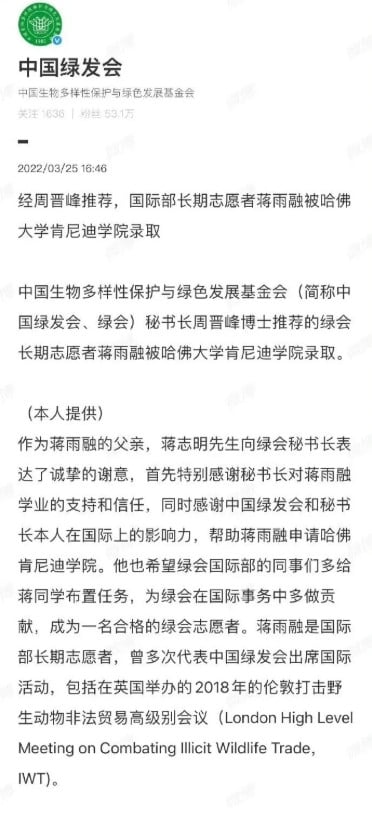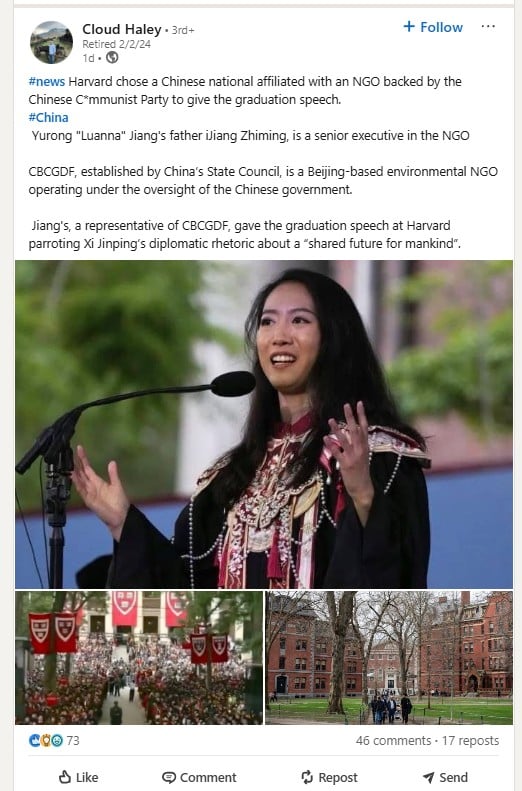A speech by Jiang Yurong, the first Chinese woman to speak at a Harvard graduation ceremony, has gone viral and sparked a firestorm of praise, suspicion and scrutiny in both China and the United States.
Delivered on 29 May 2025, Jiang’s speech came just days after a US federal judge blocked a controversial Trump’s ban that would have restricted foreign students’ enrolment at Harvard.
On the same day, US authorities reiterated plans to “aggressively” revoke visas for certain Chinese students.
In her speech, Jiang urged for global unity amid growing geopolitical divides. “We don’t rise by proving each other wrong. We rise by refusing to let one another go,” she said.
She praised Harvard’s international classrooms for teaching students to “dance through each other’s traditions” and “carry the weight of each other’s worlds.”
Her remarks resonated deeply with many Chinese netizens.
The speech rapidly gained traction on platforms like Weibo and WeChat, where users described it as emotionally moving. Some said they were brought to tears by her words.
Controversy follows viral speech amid questions over elite ties
However, soon after the speech went viral, controversy emerged over her background and the legitimacy of her academic journey.
Online discussions in China and the US questioned whether Jiang had benefitted from elite connections to secure admission to Harvard Kennedy School.
Central to the debate is the China Biodiversity Conservation and Green Development Foundation (CBCGDF), a Beijing-based NGO under the oversight of China’s State Council.
Jiang’s father, Jiang Zhiming, is a senior executive at the organisation, which has previously published posts—now deleted—suggesting it recommended her to Harvard.

Some critics allege that her recommendation was not purely academic.
They argue it symbolises how powerful individuals in China may use influence to secure educational privileges abroad.
In the US, conservative commentators have taken aim at her alleged connections to state-linked organisations.
A X (formerly Twitter) account, @amuse, criticised Harvard for choosing “a representative of a CCP-funded and monitored NGO” to deliver the commencement address.
HARVARD: Why would Harvard select a Chinese national affiliated with a CCP-backed NGO whose father is a high ranking official in that NGO that serves as a quasi-diplomatic agent for the CCP to give the school’s commencement address this year?
Yurong “Luanna” Jiang, a… pic.twitter.com/NY8JjefRbH
— @amuse (@amuse) May 31, 2025
On LinkedIn, one user claimed accused Jiang of repeating diplomatic rhetoric associated with Chinese President Xi Jinping, including the phrase “shared future for mankind”.

These allegations have fanned existing tensions over Chinese influence in US institutions.
US officials previously accused Harvard of “co-ordinating with the Chinese Communist Party” during earlier attempts to limit foreign student enrolment.
Jiang publicly responded to the criticisms.
Jiang rebuts privilege claims and outlines academic journey
On a Weibo account believed to be hers, Jiang stated that she was raised by her mother following her parents’ divorce and denied holding any foreign citizenship or green cards.
She also provided details of her academic path. After experiencing bullying during her early years, she won admission to Cardiff Sixth Form College in the UK—described as one of the most academically rigorous high schools—without connections or favouritism.
From there, she enrolled at the University of Warwick to study Philosophy, Politics and Economics, before transferring in her third year to Duke University in the US. She later secured admission to Harvard’s Kennedy School of Government.
Jiang clarified that she submitted three recommendation letters with her Harvard application—from two academic mentors and a former supervisor at Credit Suisse.
While the CBCGDF did provide a fourth recommendation, it was ultimately not included due to submission limits.
Despite her explanations, scepticism has persisted.
On Weibo, users continued to question whether Jiang had used backdoor channels.
Some accused her of fabricating a rags-to-riches narrative. Others focused on CBCGDF’s history of regulatory warnings, including a case involving the misallocation of 500,000 yuan in charity funds.
Some Chinese users defended Jiang, arguing that the NGO she volunteered for had worked with prominent Western partners.
Others, however, accused her of representing “Baizuo” (白左), a derogatory term used in China to mock liberal Western ideologies.
Amid the noise, Jiang maintained her innocence.
She reiterated that her journey was based on merit and hard work.
“I had little contact with my father growing up,” she said. “My life was shaped by hardship, not privilege.”
With around 6,800 international students—comprising 27% of enrolment—Havard university continues to be at the centre of US-China educational tensions.
Approximately one-third of Harvard’s foreign students come from China.
The post Harvard graduate Jiang Yurong’s speech draws backlash over background and alleged political ties appeared first on The Online Citizen.


